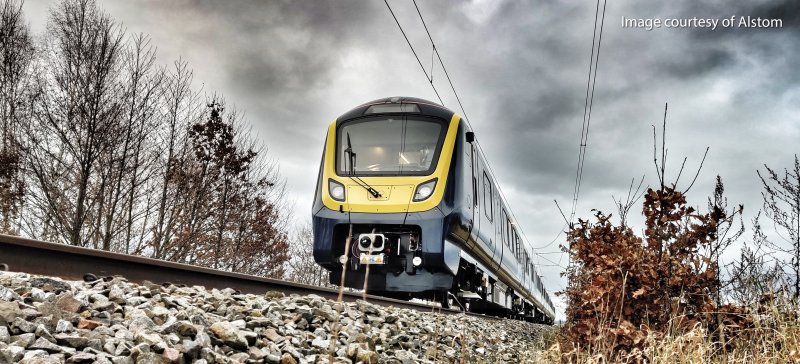Eversholt Rail is empowering a completely carbon-free UK railway
The UK is super serious about its net zero carbon commitment and Eversholt Rail, a CK Infrastructure (CKI) member company, is doing its bit to support this national objective. By working with Alstom Transport, a world leader in hydrogen train technology deployment, Eversholt Rail is on course to introduce new zero-emission trains to the world’s first – and oldest – railway system.
Diesel out!
The British invented railways and have always strived to stay at the cutting edge of railway development. National plans call for phasing out diesel-only trains – 29% of the industry total – by 2040 or earlier. Eversholt Rail owns almost 3,400 rail vehicles, a significant share of the UK’s passenger and freight rolling stock. It doesn’t operate them, but rather leases them to rail operators across the country. It plays a key role in conducting research and advising clients on how to meet their corporate goals under national priorities.
In that capacity, Eversholt Rail is working with Alstom Transport to develop the UK’s first-ever trains powered by hydrogen fuel cells, building on the companies’ combined experience of hydrogen propulsion technology and the successful introduction of new train fleets. Rather than a traditional Thomas the Tank Engine model with a single engine pulling train cars, they use a “multiple unit”: a train made up of several vehicles with traction power distributed among them.

Hydrogen in!
While the electrification of a significant proportion of the UK rail network is part of the zero-emission plan, it isn’t cost-effective or practical in all instances. Zero-emission medium-distance train journeys can be driven more efficiently by hydrogen-powered multiple units. Electrification entails significant costs for the installation of the overhead line equipment from which electric trains draw their power and takes routes out of commission during the installation process. Bi-mode trains that run on diesel and switch to electricity on electrified tracks are only a partial solution. They emit particulates, carbon dioxide and other gases when in diesel mode and have higher maintenance and capital costs than pure electric trains.
Hydrogen fuel cell trains can replace diesel trains without the operator being forced to suspend operations, lose revenue and upset customers on the affected routes. Also, compared with bi-mode trains, they are truly zero-emission when fuelled with green hydrogen produced from renewable sources of electricity. Like pure electric trains, they also have lower maintenance costs thanks to their inherently simpler construction.
Eversholt Rail is working with Alstom Transport to develop the UK’s first-ever trains powered by hydrogen fuel cells.
Customised design
Eversholt Rail is aiming to sign the final contract (following a 2021 MOU) for 10 brand-new hydrogen trains this year. Each train comprises three vehicles. The deal is much more than a buy-then-lease arrangement. Eversholt Rail and Alstom will work closely together, sharing technical and commercial information that will be needed to provide a hydrogen train optimised for the unique needs of the UK railway system.
For example, the UK’s railway tunnels are smaller than Europe’s, with less clearance for the tops of trains. This means that special care must be taken in installing equipment mounted on the train roof, while still maximising the experience gained from the design of Alstom’s hydrogen trains for Germany, Italy and France. Eversholt Rail’s expertise in working with England and Scotland’s rail operators will be invaluable. The interior design and layout will need to be customised for these experienced railway companies, using their input to ensure that the trains suit their needs.
Safety is, of course, of paramount importance. Eversholt Rail and Alstom will work closely with the UK regulators to pioneer the introduction of safe trains particularly suited to the UK market. An extensive programme of testing and approvals is a must.
Eversholt Rail’s financing and asset management expertise will also be needed as they work with customers to develop compelling business cases for the introduction of hydrogen trains to replace ageing diesel fleets. There is a strong government focus on achieving value for money from investment in rail, and the new fleet offers excellent opportunities for train operators to enhance the passenger service experience while achieving zero-emission goals.
Take the H Train: They are truly zero-emission when fuelled with green hydrogen produced from renewable sources of electricity.
More than clean air
The Alstom Aventra platform on which the new rail cars will be built is regarded as the “fastest, smartest, and most economical platform in modern rail”. Fastest: in terms of acceleration, as trains can get up to maximum speed faster and reduce overall journey times. Smartest: units will have the latest in diagnostic sensors on board to detect when and where maintenance is needed, making operations more efficient. Economical: the cost of maintenance will be the lowest in the business. The market has recognised the potential with 2,665 Aventra electric vehicles already on order for operation on the UK network.
As the rest of the nation decarbonises, rail must play its part and Eversholt Rail will be on the cutting edge of empowering rail companies to get on board the green train to a cleaner, greener future.